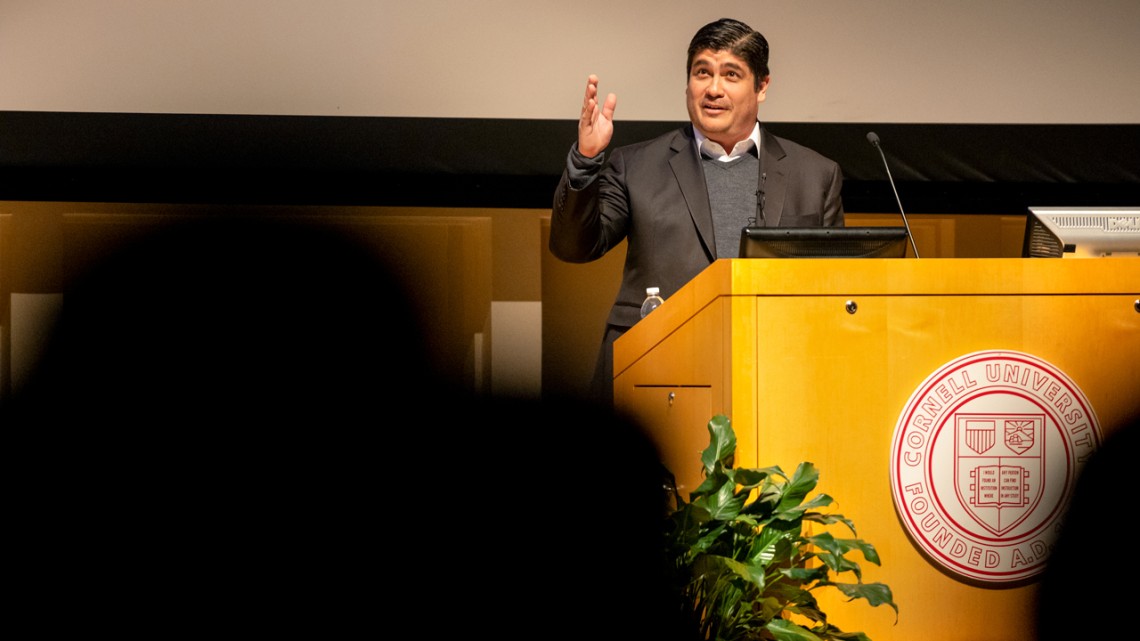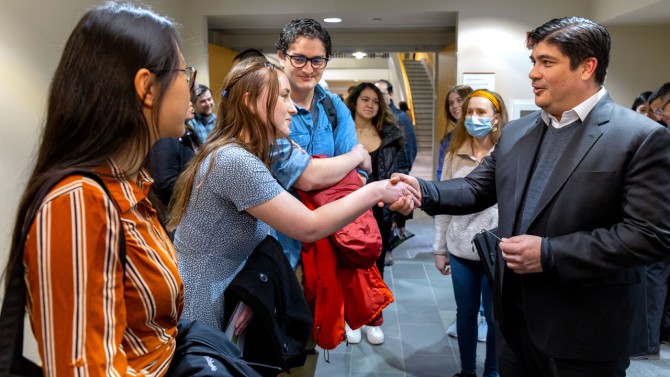
Carlos Alvarado Quesada, former president of Costa Rica, delivers the Bartels World Affairs Lecture on March 22.
Former Costa Rica president: Love can change the world
By Laura Gallup, Cornell Chronicle
When Carlos Alvarado Quesada, former president of Costa Rica, launched the National Decarbonization Plan in 2019, naysayers said it was impossible and that his efforts would cripple the country’s economy. Opponents also questioned the point, since the country’s emissions represented such a tiny portion of a global issue.
Today the country continues to make strides toward reaching net-zero carbon emissions by 2050 and the plan is predicted to save about $40 billion, and experts have suggested that other regions follow suit.
“Never underestimate the power of example, never underestimate what your contribution can be,” Alvarado said. “Even if you tend to feel small, good ideas can encourage, have the power to change the world in a positive way.”
Alvarado spoke at the Bartels World Affairs Lecture, hosted by the Mario Einaudi Center for International Studies, on March 22 in the Alice Statler Auditorium on how he dealt with challenges related to democracy and the environment during his presidency from 2018 to 2022.
Alvarado recounted that in 2014, he had left politics and thought he would never go back. Later that year his son was born, and his feelings of responsibility surged.
He then worked under the Solís Rivera administration and in 2016 three world events shook him: The Colombian people rejected a landmark peace deal; Donald Trump was elected president in the U.S. and British citizens voted to leave the European Union. At the same time, populism began to dominate the political scene in Costa Rica, which Alvarado saw as opposition to democracy.
“The leading political candidate was talking about extreme measures; not recognizing decisions by the judiciary system, enforcing law in a way that threatened human rights,” Alvarado said. “And those positions that were thought to be extreme were becoming dominant in the public opinion. I got really angry. I was hopeless.”
While contemplating what was at stake for his country and his son’s future, Alvarado decided to do something about it.
“It was never before in my path,” Alvarado said of his decision to run for president. “I was not that kid that was singing the national anthem in school looking at the flag and saying 'One day, I'll become president.’ Never, not in my wildest dreams. But then I saw it was necessary to get involved and to step up, and that's why I took that decision.”
Alvarado’s political agenda was not popular in the historically conservative country; he wanted to challenge populism, avoid impending fiscal default by enforcing taxes, decarbonize the economy and support human rights such as same sex marriage and access to abortion.
He drew inspiration from the ideals of previous generations of Costa Ricans. In the 1940s, his nation had abolished its army, creating a pathway to a national park system and reversing deforestation.
“When everybody thought that you needed an army in Latin America in order to protect yourself, the insight was that armies actually contributed to coups d’état in democratic governments or ended up fighting guerrilla movements,” Alvarado said.
“Currently, Costa Rica’s got 55% of forest coverage. It is one of the few examples in the world that you can reverse deforestation and keep growth in the economy.”
Alvarado’s ambitious ideas helped Costa Rica earn the 2019 Champion of the Earth Award, the United Nations’ highest environmental honor.
He told the audience that intergenerational love is what inspires him to keep working toward good: love for the people who came before him and for those who will come after.
“In love, there is a huge power to accomplish,” he said. “Responsibility is the manifestation of that love we have for others that we can exercise in the public sphere, in science and politics, to change things. Good change is possible. Don’t let anyone tell you the contrary. Love has the capacity to change the world.”
After Alvarado’s lecture he sat down for a Q&A with Mario Herrero, professor of sustainable food systems and global change in the Department of Global Development (College of Agriculture and Life Sciences). A student in the audience asked him what skills he wished he had learned before his presidency.
“You need to know yourself,” Alvarado said. “Sometimes when we come to university, we think it’s kind of like the Matrix – like we got into a course to update our software, to know how to do things. So, we focus outside of ourselves; I’m going to learn this craft, I’m going to learn this technique. But we don’t necessarily focus on who we are or what we believe. Do what you love, and love what you do.”
The Bartels World Affairs Lecture brings distinguished international figures to campus each academic year to speak on global topics and meet with Cornell faculty and students, particularly undergraduates. The lecture and related events are made possible by the generosity of Henry E. Bartels ’48 and Nancy Horton Bartels ’48. This year’s event was cosponsored by Einaudi's Latin American and Caribbean Studies Program.
Media Contact
Adam Allington
Get Cornell news delivered right to your inbox.
Subscribe

